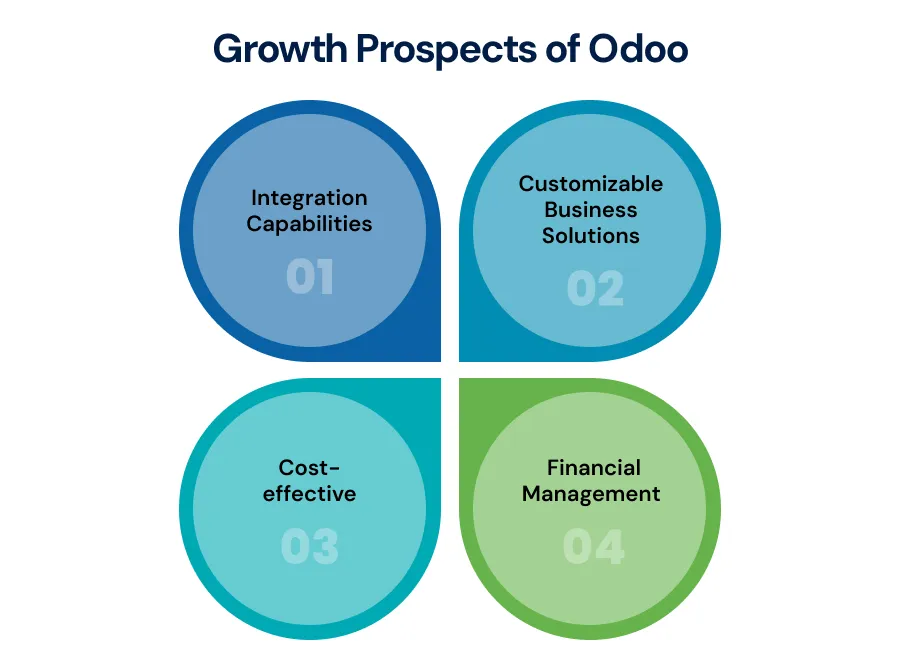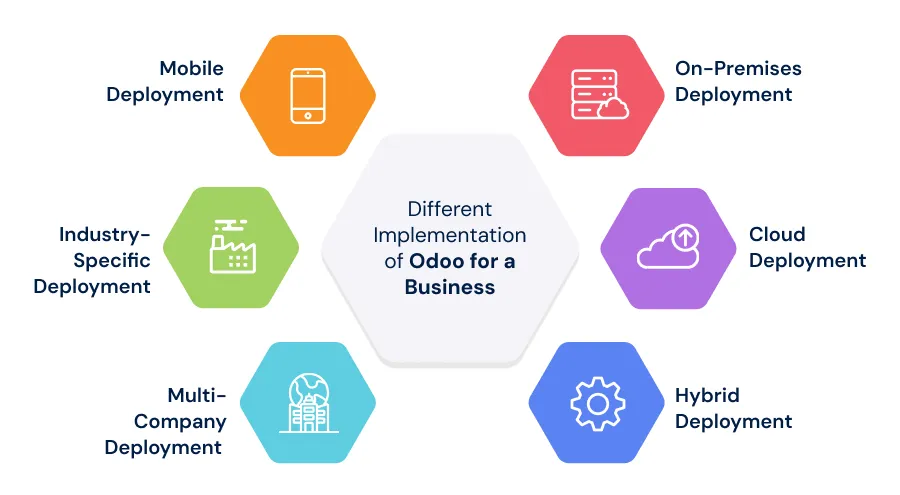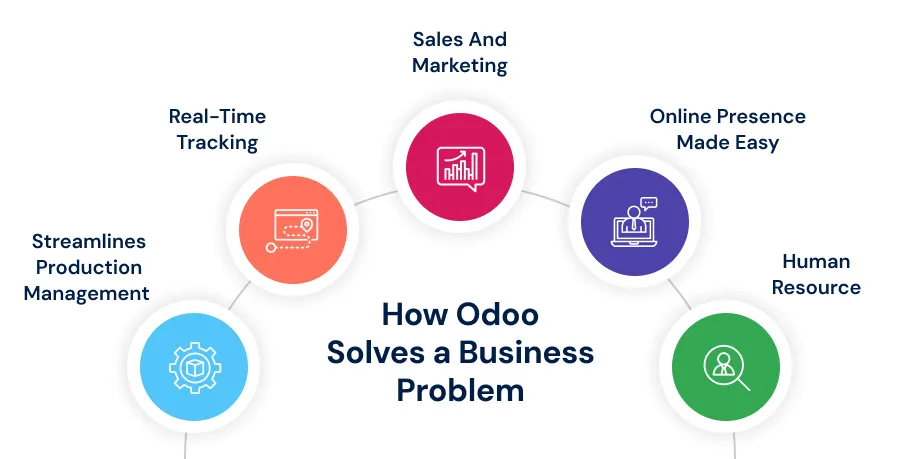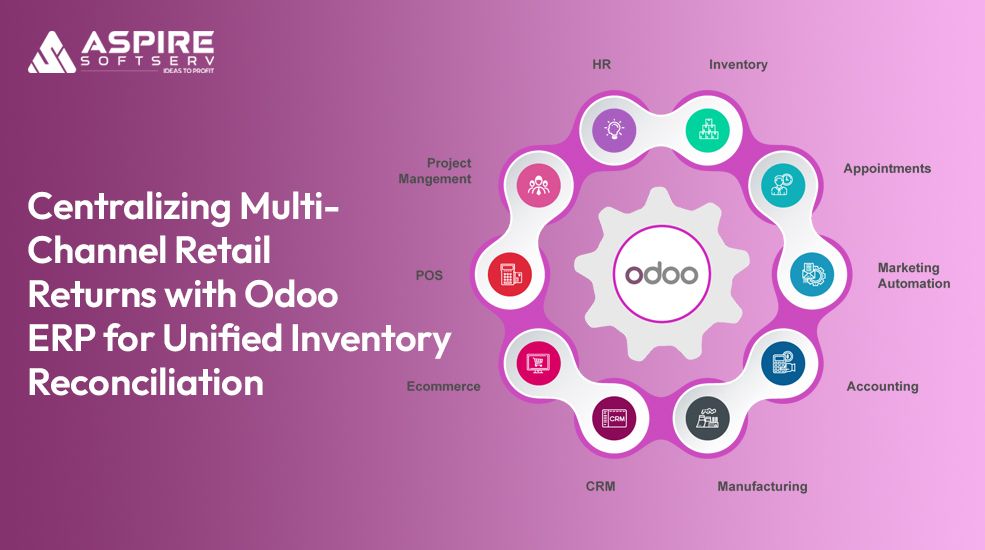
Introduction
Each business is dynamic and has different requirements. There needs to be a system in place. The system must meet the requirements and streamline the business operations. From marketing to finance there needs to be a process that unifies them. Unification will help to achieve the goals and objectives of the organization. But what can be this revolutionary solution?
Odoo ERP development is a revolutionary solution. Odoo is business management software that helps to integrate various applications to meet diverse business needs. It helps to integrate the different aspects of a business. It makes sure that everything comes together in a unified way.
Odoo for Business is a robust software solution. It helps to stay ahead of the competition with its multi-utility features. This is a one-stop solution for streamlining and automating specific tasks. With automation, it reduces the added cost and the need for human resources.
Dive deep into the blog below to understand the Odoo development software. Check how it helps businesses to scale.
What Is Odoo and What Solutions Does It Provide?
Launched in 2005 as TinyERP, it has now evolved as Odoo in 2014. It has come forward into a unified business management solution. It has many modules covering everything from accounting to marketing and more. It is becoming a popular choice for SMEs because:-.
1. It can adapt to specific business requirements.
2. It is customizable so you can adapt it to various businesses.
3. One can select desired applications according to business needs.
4. Scalability becomes easy with Odoo. With odd one can add new modules and functionalities to accommodate changing needs.
Odoo provides many solutions with its modules. Organizations need not navigate the complexities alone. Because Odoo will assist them. It will be a helping hand in different departments. It will make sure that the organization achieve success.
Growth Prospects of Odoo

In the realm of changing business requirements, we need to target growth. Odoo module development has emerged as a partner for an organization’s growth. With its many modules, it meets the needs of modern enterprises. It helps to customise solutions. It makes sure that every department gets an equal focus to attain overall efficiency. Let's delve into the factors driving the growth prospects of Odoo.
1. Integration Capabilities
Businesses have many needs. It has many streams of operations such as finance, accounts, HR and more. Odoo helps to integrate the different streams of operations. It helps businesses to have a cohesive ecosystem with streamlined operations.
2. Customisable Business Solutions
Odoo helps to match the exact needs. It can deliver customisable business solutions. It allows businesses to operate. It helps the organisation to have cutting-edge functionalities as per their evolving needs.
3. Cost-Effective
Odoo business solutions do not have huge licensing fees. It has flexible pricing quotations to choose from. It also makes the process simple and paperless. This in turn reduces the need for added funds and human resources. It is a cost-effective measure that will help you scale your business in the long run.
4. Financial Management
This helps to check the financial performance. It also helps to gain insights into your financial data.
1. Accounting and bookkeeping
2. Budgeting and forecasting
3. Reporting and analytics
Gaining Insights Into Financial Data Can Help To:
1. Make better policies
2. Track unwanted expenses
3. Analyze key financial metrics
It helps to have a complete sight of all the financial data in your hands which can be used as per the need.
Different Implementation of Odoo for a Business

Odoo is a broad solution that caters to many business requirements. Implementing it in business requires a clear breakdown of needs and business processes. Some of the basic ways to install Odoo in the business are: -
1. On-Premises Deployment
It allows the installation of Odoo ERP software on the company’s server. This makes sure that the respective organisation has full access to data. It helps to:-
1. Have complete control over the system and data
2. Ensures data security
3. Ensure comps compliance with the company’s internal policies
4. Allows for extensive customization.
5. Accommodates dynamic business requirements.
6. Optimise tasks for a specific business.
2. Cloud Deployment
It allows the Odoo to install on a cloud. This helps to permit access to the Odoo software from anywhere. Have a stable internet connection and access it. This type of implementation helps with the:
1. Convenient access to Odoo from anywhere
2. Facilitates remote work without the need for physical presence
3. Facilitates the process of scaling up or down based on changing needs
4. Eliminates the investment of extensive hardware.
3. Hybrid Deployment
This deployment is a mix of on-premises and cloud. It offers: -
1. Combination of benefits of both on-premises and cloud.
2. Flexibility to leverage existing infra while taking advantage of cloud benefits.
3. Businesses can optimize costs while maintaining control
4. Organizations do not need to have separate deployments for varied needs.
4. Mobile Deployment
This deployment allows the implementation of Odoo on smartphones and tablets. It offers the following advantages: -
1. Accessibility of Odoo from anywhere with phones.
2. Ensures users stay connected and informed.
3. Enhances productivity and responsiveness.
4. Freedom to perform tasks on the go.
5. Industry-Specific Deployment
It ensures that Odoo meets specific business needs. Odoo has many modules and offers extensive flexibility. Odoo is there for any industry such as production, healthcare, retail, and education. It allows:-
1. To follow sector sector-specific regulations
2. To mitigate risk
3. Ensuring adherence to best practices as per the industry
6. Multi-Company Deployment
Odoo can manage many companies within one single broad system. It helps to:
1. Have centralized management of various entities.
2. Simplify operations as many entities are under one umbrella
3. Reduce overhead costs for many entities
4. Enhance collaborations across entities.
The choice of Odoo implementation depends on the needs of specific businesses. The organisation needs to understand what it strives to meet. Then choose the type of Odoo implementation.
See Also: Optimizing Inventory Management Efficiency with Odoo ERP Software
How Odoo Solves a Business Problem?

Odoo offers different modules to cater to different problems. From sales to inventory, organizations can achieve efficiency and effectiveness. Some of the Odoo use cases for Odoo in businesses are: -
1. Streamlines Production Management
Odoo helps to manage invoices, schedule work, divide resources, and streamline product processes. It helps to make sure that the entire production process is simple. Odoo will assist you with bills and work orders. Streaming the production process ensures that the organisation achieves control over its operations. Organisations can cut down on unnecessary costs.
2. Real-Time Tracking
Odoo’s inventory module helps the organization track the inventory level in real time. It helps to get answers to all the queries related to the same. These real-time insights help to:-
1. Optimize the stock replenishment
2. Prevent the situation of stockouts
3. It helps to minimise the storage cost
4. It helps to ensure accurate stock counting
5. It helps to ensure that there is complete inventory accuracy.
3. Sales and Marketing
Odoo business works to assist the organization in its sales and marketing strategies. From lead generation to campaign management, Odoo does everything. It helps organizations to:
1. Understand the customer behaviour and plan decisions
2. Schedule automated follow-ups with the customer without any more cost.
3. It offers robust CRM by managing customer data and enabling personalized strategies
4. It helps to nurture leads by enhancing marketing capabilities and enabling personalization
4. Online Presence Made Easy
Odoo is a one-stop solution to establish a chain of robust solutions. It helps to build effective e-commerce strategies. It helps businesses with:
1. Maintaining a powerful online presence
2. Providing easy-to-use website-building tools
3. Blogging options to simplify the content part
4. Strong e-commerce features to drive sales and customers
5. Human Resource
Human resources is the most powerful asset of the organisation. Efficient maintenance of HR can help contribute to the growth of the organisation. Odoo implementation can help with:
1. Performance evaluation of the employees
2. Automate HR processes
3. Helps the business to manage employee information.
Conclusion
Odoo stands as a versatile solution for many types of businesses. It provides efficient ways to manage operations. Odoo can help businesses stay ahead of the curve. It provides access to cutting-edge functionality.
Odoo gives access to comprehensive modules. It can match every need and drop the complexities of modern businesses. It is your one-stop solution that offers flexibility and scalability. From optimised production to efficient HR management, Odoo caters to all the functions.
After knowing all the advantages of Odoo, an organisation must plan to try it out. Organisations can have the largest efficiency. Hire Odoo developer who can help you to navigate the business complexities. It uses the many modules to deliver solutions.
Visit our web page to get access to Odoo development services. We will help you connect with the best and scale your business. You can also write to us at [email protected] and we will get back to you.



